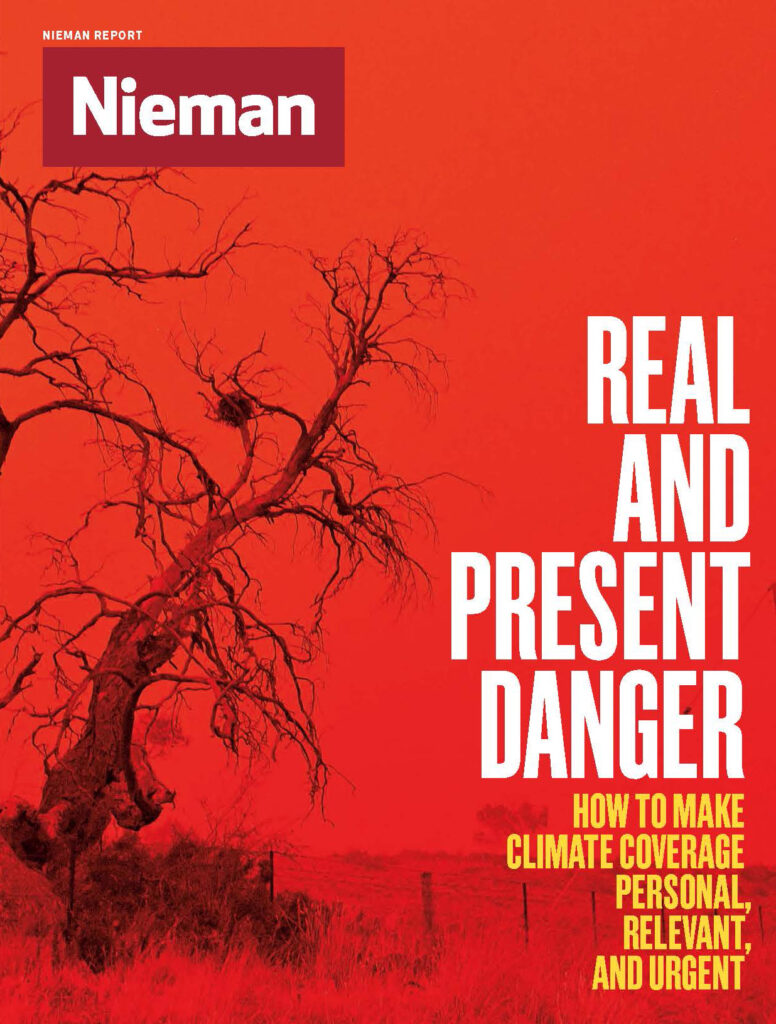
The volume of climate change coverage has been on the uptick in recent years, and hardly a day goes by when climate change and its consequences aren’t in the headlines. However, it remains one of the most challenging—yet important—stories for the media to cover well, given the sheer complexity and magnitude of the problem.
Nieman Reports takes a look at journalists and news organizations who are working in innovative ways to make climate coverage more personal, urgent, and engrossing.
In October 2010, I was having dinner with Paul Salopek, sorting through the news industry’s vanishing support for foreign reporting, his work. “I have an idea,” he said, and on the back of our receipt he drew a crude map of a 21,000-mile reporting walk across the globe.
It was preposterous and inspiring, one journalist’s effort to sustain a vital form of storytelling by slowing the news cycle to the pace of a walk. After two years of planning, he set out from Ethiopia. Nineteen million footsteps and hundreds of stories later, he is in Myanmar and still walking.

Finding our restaurant receipt recently was a reminder of both the fragility and inevitability of journalism. Salopek’s newspaper, the Chicago Tribune, had shuttered its foreign bureaus, a storied service more than a century old, and from that sprung reinvention in the form of the Out of Eden Walk. But while Salopek is one of the most accomplished journalists of his generation—working for the Tribune he won Pulitzer Prizes for both explanatory and international reporting—he had no illusions of replacing the journalism that a dozen bureau correspondents and their editors had once offered Chicago’s readers. How could he?
A similar question looms for Salopek’s former Tribune colleagues, the city of Chicago, and virtually all local news outlets, though now in existential form. A central challenge for the industry is whether innovation, new platforms, and alternative ownership structures can progress fast enough to make up for the loss of legacy journalism. The story playing out in the nation’s third largest city is about to provide a dramatic response.
Alden Global Capital, a New York hedge fund with a reputation for more newsroom strip-mining than investing, acquired a third of Tribune Publishing Company shares and is poised for majority control. A new round of newsroom buyouts has already begun and there is nothing in Alden’s ownership record to suggest they would stray from a playbook Nieman Lab contributor Ken Doctor has described as “unapologetically cutthroat.” That formula, imposed recently at the Denver Post, features hedge fund gluttony in three familiar acts: slash newsroom staff, disinvest in digital, hike costs for dwindling subscribers. Absent initiatives to grow the industry, Alden specializes in milking its decline. Targeted cuts that eliminated sections, merged suburban bureaus, stripped copy desks, outsourced Washington coverage, or collapsed foreign bureaus have all been exacted. What comes next is marrow.
Alden has been publicly silent on its plans, so as a twisted thought experiment, let a journalist try to imagine a defense. Chicago was once home to 11 daily newspapers and this is but a final chapter in managing print’s decline. The Tribune itself historically benefitted from the failing health of its competitors, acquiring their subscribers and advertisers. Now, new digital platforms threaten it. As a senior executive for one of the platforms once told me and some colleagues, “It’s not our job to fix your business model.”
In recent years, a new crop of journalism startups has begun changing the reporting landscape in Chicago. ProPublica, perhaps the nation’s most decorated nonprofit investigative news organization, opened its first regional newsroom in Chicago, ProPublica Illinois. City Bureau, a collaborative covering Chicago’s south and west sides; Borderless, a magazine reporting on immigration; Block Club, a neighborhood news site founded by former DNAinfo editors; and TRiiBE, a digital platform to “reshape the narrative of Black Chicago,” have all contributed to both diversifying and filling some gaps left in the news reports of the city’s traditional media. La Raza, the Polish Daily News, and the Korea Times are among the newspapers serving Chicago’s large ethnic communities. And the Tribune and its tabloid competitor, the Chicago Sun-Times, combine to make Chicago one on a single-digit list of U.S. cities with two daily papers.
But that paragraph you just read is deceptive. The small reporting staffs of all of those startups combined cannot yet replicate even the shrunken capacities of the Tribune, which in some cases has amplified nonprofit newsroom stories by serving as a reporting and publishing partner. In a remarkable concession, a host for a leading Chicago radio station recently described the dependency that broadcast news programs have on the Tribune.
“If you lose the Tribune, electronic media loses too,” said John Williams, a talk show host for WGN-AM (once a Tribune Company property whose call letters stood for World’s Greatest Newspaper). “Radio and TV stations read the paper every day, 24 hours a day now, to see what the Tribune is saying. So all of the news gathering—the amateurs, the commentators, and those of us who are your competition—are all kind of feeding off of” the paper, he said. Williams added: “We all need a viable and aggressive Chicago Tribune.”
Williams said this during an interview with Mary Schmich and Eric Zorn, veteran Tribune columnists who have been part of an unusual newsroom campaign to sound an alarm about Alden and cast for a benevolent buyer, no longer willing to leave the business to the business side.
In December, under the headline “A letter to the next owner of the Chicago Tribune: We need you,” the Pulitzer Prize-winning Schmich published an open appeal in her own newspaper for someone to rescue the Tribune. “You understand that buying a newspaper is more than a financial investment,” she wrote. “It’s an investment in community and democracy.”
The following month, senior investigative reporters David Jackson and Gary Marx wrote an op-ed for The New York Times also appealing for civic investment. “Unless Alden reverses course—perhaps in repentance for the avaricious destruction it has wrought in Denver and elsewhere—we need a civic-minded local owner or group of owners. So do our Tribune Publishing colleagues.”
How likely is it that Alden repents? Not very. During the radio interview, even Schmich conceded, “I think there is some wish that they can be shamed but there is no indication that they can be.”
Both the Tribune and Times columns generated significant social media attention, but it was a December commentary in Crain’s Chicago Business, the city’s leading business journal, that underscored the immediate promise and peril for local journalism. The piece, co-authored by officers from five leading Chicago foundations, began with a striking rebuke of the business community for underinvesting in journalism and closed with a call for a pooled fund supporting local media. Unfortunately for the Tribune, they didn’t mean old media.
“While the major news outlets are finding their way in this new environment,” the commentary curiously concluded, “dozens of smaller independent outlets are striving to serve Chicago’s diverse populations. But they need philanthropic intervention to thrive.”
Those outlets do need support. But what Chicago and so many local news markets also need is a strategy to bridge the chasm between the now and the next.
When I was editor of the Tribune, another newspaper editor in our company confided that he had quietly approached a university president in his circulation area to ask whether the school would consider acquiring the paper. His pitch: the arrangement could provide tremendous educational opportunities for university students, protect an important civic asset benefitting both the university and the community, and place journalism assets in the hands of a respected nonprofit. The complications were many and it never happened. But it was an ambitious idea to wholly reimagine the structure of local journalism, the kind we need more of, one that built something new on the foundation of the community’s most experienced news provider.
That paper remains in the Tribune portfolio, now vulnerable to Alden’s appetites.



